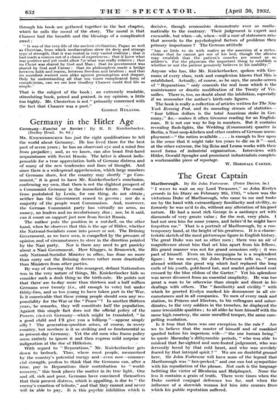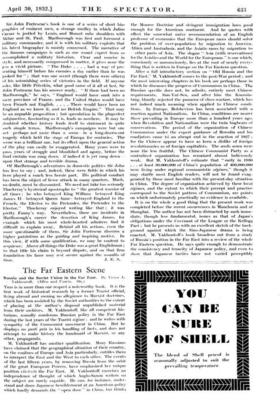The Great Captain
Marlborough. By Sir John Forteseue. (Peter Davies. as.)
" I want to wait on my Lord Treasurer," so John Evelyn records in his Diary on February 9th, 1705, "where was the victorious Duke of Marlborough, who came to me and tooke me by the hand with extraordinary familiarity and civility, as formerly he was us'd to do, without any alteration of his good nature. He had a most rich George in a sardonyx set with diamonds of very greate value ; for the rest, very plain. I had not seen him for some yeares, and believ'd he might have tbrgotten me." That is a portrait of Marlborough, by a con- temporary hand, at the height of his greatness. It is a charac- teristic sketch of the most picturesque figure in English history. The great Duke was not as other men ; there was an air of magnificence about him that set him apart from his fellows. His grand manner was not for grand occasions only ; , it was part of himself. Even on his campaigns he is a resplendent figure ; he was never, Sir John Forteseue tells us, " seen abroad without the great wig which had replaced the long curls of his youth, gold-laced hat, and scarlet gold-laced coat crossed by the blue ribbon of the Garter." Yet his splendour was never divorced from an essential simplicity. He was too great a man to be otherwise than simple and direct- in his dealings with others.. The " familiarity and civility " with which he greeted Evelyn marked his demeanour in all cir- cumstances and in all companies. To men of every rank and station, to Princes .and Electors, to his colleagues and subor- dinates, to the very soldiers in the trenches, he displayed the same irresistible qualities.; to all alike he bore himself with the same high courtesy, the same unruffled temper, the name com- pelling resolution.
Is it true that there.was one exception to the rule ?. Are we to believe that the master of himself and of mankind quailed before. his imperious wife—" the one human being," to quote Macaulay's dithyrambic periods, "who was able to mislead that far-sighted and sure-footed judgement, who was fervently loved by that cold heart, and who was servilely feared by that intrepid spirit ? " We are on doubtful ground here. Sir John Fortescue will have none of the legend that ,Marlborough was ." hen-peeked," and one can but sympathize with his repudiation of the phrase. Not such is the language befitting the Victor of Blenheim and Malplaquet. None the less it contains a grain of truth. There were times when the Duke carried conjugal deference too far, and when the influence of a shrewish woman led him into courses from which his public reputation suffered. Sir, John Forteseue's book is one of .a series of short bio- graphies of eminent men, a strange medley in which Julius caesar is jostled by Lenin, and Mozart rubs shoulders with Akbar and ,St. Paul. Madbors-Mgh was first and foremost a military commander, and it is with his military exploits that his latest biographer is -mainly concerned. The narrative of the famous campaigns is such as one would expect front so accomplished a- military historian. Clear and concise in style. andnecessarily compressed in matter, it gives none the less a vivid picture: The Duke had a way of pre- senting himself before his enemies a day earlier than he was looked for " : that was one secret (though there were others) a his astonishing series of victories in the field. If anyone asks, like little Peterkin, what good came of it all at last, Sir John Forteseue has his answer ready. " If there had been no Marlborough," 1M says, England would have sunk into a mere province of France, and the United States would have been French not English •• -There would have been no England as we know it. and no-British Empire." 'That may be an arguable proposition ; but :speculation in the pluperfect subjunctive, fascinating as it is, leads us nowhere. It may be doubted whether history lends itself to statement in quite such simple terms. Marlbswough's campaigns were but one act-- perhaps not 'unix than a scene-- in a long-drawn-out tragedy which held- the stage of Europe for centuries. The WOOS was a brilliant one, but its effect upon the general action of the play can easily be exaggerated. Many years were to [MSS, years of struggle and bloodshed and agony, !Aline the final curtain was rung down if indeed it is yet rung down -- upon that strange and terrible drama.
Of Marlborough's adventures in domestic politics Sir John has less to say ; and, indeed, these were field4 in which his hero played a much less heroic part. Ibis political conduct has been the object of tierce attack in many quarters. Much., no doubt, must be discounted. We need not take too seriously Thackeray's hysterical apostrophe to " the greatest warrior of all times ; he who betrayed King William- betrayed King James 11--betrayed Queen Anne--betrayed-England to the French, the Elector to the Pretender, the Pretender to the Elector." Thackeray enjoyed *riling like that : it was pretty Fanny's way. Nevertheless, there are incidents in Marlborough's career. —the desertion of Thing James, for example-- which his most whole-hearted admirers find it difficult to explain away. Behind all his actions. even the more" questionable of them, Sit' Ji)101 Fortescue discerns higher patriotism as the guiding and inspiring motive. In this view, if with some qualification, we may be content to acquiesce. Above all things the Duke was a great Englishman; to that title his claim is beyond dispute, and sin that firm foundation his fame may rest secure against. the assaults of







































 Previous page
Previous page